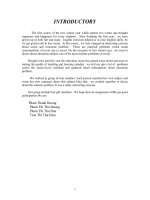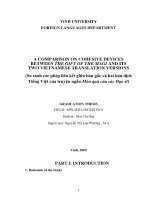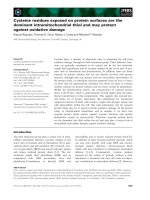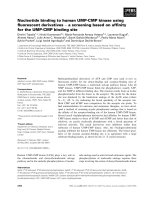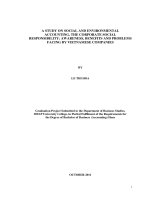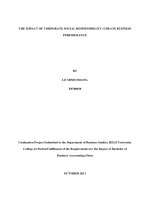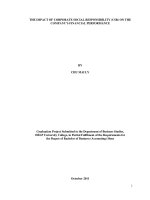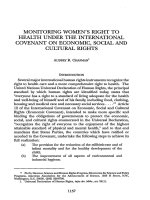Scientific basis on managing universities under the ministry of industry and trade in the orientation of autonomy and social responsibility
Bạn đang xem bản rút gọn của tài liệu. Xem và tải ngay bản đầy đủ của tài liệu tại đây (343.73 KB, 31 trang )
MINISTRY OF EDUCATION & TRAINING
VIETNAM INSTITUITION OF SCIENCE & EDUCATION
----------------------o0o--------------------------
LE THANH TAM
SCIENTIFIC BASIS ON MANAGING UNIVERSITIES UNDER
THE MINISTRY OF INDUSTRY AND TRADE TOWARDS
AUTONOMY AND SOCIAL RESPONSIBILITY
Specialization: Education Management
Code: 62.14.01.14
A SUMMARY OF THE DOCTORAL DISSERTATION OF
SCIENCE AND EDUCATION
Supervisors:
1. Prof. Dr. Nguyen Thi My Loc
2. PGS.TS. Nguyen Tien Hung
Ha Noi - 2014
INTRODUCTION
1. REASON FOR THE CHOICE OF TITLE
In the context of globalization and international integration of higher education
in Vietnam, autonomy and social responsibility of the higher education institutions
become more urgent than ever, which is the mode of operation critical for the success
or failure of the higher education innovation in Vietnam.
Therefore, to quickly meet the requirements of the country in training highly
qualified human resources to serve the social and economic development of the
country, the higher education in our country must continue to innovate basically,
comprehensively and powerfully, in which the requirement to innovate the
management of universities is an urgent requirement.
Ministry of Industry and Trade now manage 51 educational institutions;
including 8 public universities, many new universities were established on the basis
of upgrading from college. According to Decree No. 43/2006 / ND-CP of the
Government, the universities under the Ministry of Industry and Trade has been given
the autonomy in three areas: organization, personnel, finance; however, in practice
the autonomy of these universities is still low; decentralization is not coupled with the
improvement in building appropriate management. The execution of autonomy is not
fully aligned with obligation and social responsibility.
In order that the universities under the Ministry of Industry and Trade perform
well their tasks and functions of training skilled manpower and doing scientific
research to meet the requirements of construction and development requirement of
the economic sectors and the country, it is necessary to look for solutions to perform
the management based on theory and practice of autonomy and social responsibility.
That is the main reason that the researcher choose to study the issue of "scientific
basis on managing universities under the Ministry of Industry and Trade towards
autonomy and social responsibility " as the research title.
2. PURPOSE OF THE STUDY
Study the scientific basis and propose solutions to the management of the
universities under the Ministry of Industry and Trade towards autonomy and social
responsibility.
1
3. SUBJECT AND OBJECT OF THE STUDY
- Object of study: Management of the universities under the Ministry of Industry and
Trade.
- Subject of study: The management of universities under the Ministry of Industry and
Trade towards autonomy and social responsibility.
4. SCIENTIFIC THEORY
The implementation of autonomy and social responsibility in the management of
universities is a key element to enable the institutions to best meet the new demands being
placed out for each university. However, the perception on autonomy and social
responsibility or on the implementation of autonomy and social responsibility of higher
education institutions are very different in our country; if the content and the degree of
autonomy, as well as the content of social responsibility and basic conditions for the
implementation of autonomy and social responsibility in the management of higher
education institutions are specified, the process of implementing autonomy and social
responsibility in the university will have a scientific basis with more feasibility.
The management of universities of the Ministry of Industry and Trade towards
autonomy and social responsibility still limited, the degree of autonomy and capacity to
implement social responsibility is till low, greatly preventing the development of each
university; If the proposed solutions to better management of autonomy and social
responsibility will help to improve the quality and effectiveness of training, and this directly
meet the urgent requirements of learners, enterprises and economic development of the
sector and social economic development of the community that it serves.
5. TASKS OF THE STUDY
- Establish a theoretical basis for the management of the universities under the
management of the Ministry of Industry and Trade and the Ministry of Education and
Training towards implementing autonomy and social responsibility
- Survey, analysis and assess the situation of management toward implementing
autonomy and social responsibility of some universities under the Ministry of Industry and
Trade - The universities were controlled in accordance with the method of parallel
management of two universities (the Ministry in charge and the Ministry of Education &
Training).
- Propose solutions in order to implement the management of the universities of the
Ministry of Industry and Trade towards autonomy and social responsibility.
- Survey the urgency and feasibility of proposed solutions; test the proposed solutions
2
6. SCOPE OF THE STUDY
Due to limited conditions, the study focused on 4 out of 8 public universities under the
Ministry of Industry and Trade: Hanoi University of Industry, Viet Tri University of
Industry, Viet – Hung Industrial University, Red Star University, and tested the solution
"Diversifying the revenue on the basis of promoting the activeness and creativity of the
individuals and divisions in the university" at Viet Tri University of Industry.
7. APPROACH AND METHODOLOGY
7.1. Approach
To accomplish the objectives of the study, the Thesis uses the following approach: The
approach of dialectical materialism, system approach, synthetic approach, change
management approach.
7.2. Specific research methods
To accomplish the objective of the research, the Thesis used the following research
methods: Method of theoretical study, method of practical study and other complementary
methods.
8. DEFENCE POINTS
Point 1: The autonomy of universities is coupled with social responsibility. University
management towards self-reliance and social responsibility related to basic aspects: Capacity of
managers at all levels of the university; university council and organizational structure,
management processes; quality assurance system inside; publicity; cultural autonomy and
social responsibility of each university
Point 2: The management of the Ministry of Industry and Trade in particular and
universities under management of two ministries in general towards autonomy and social
responsibility has typical features: the mechanism for coordination / management coordination
between the Ministry in charge (Ministry of Industry and Trade) and the Ministry of Education
and Training is not yet fair: The issue of professional guidance and implementation conditions;
the issue of human needs and training criteria; matter of opinion and deployment of
decentralizing autonomy and social responsibility of the two ministries toward universities have
not been uniform; Most of the universities under the Ministry in charge themselves were
upgraded from colleges, so the capacity of autonomy and implementation of social
responsibility is low; The investment of resources for the management of university towards
autonomy and social responsibility of the Ministry in charge has gained more attention, but still
low compared to the actual requirements.
3
Point 3: The measures implemented to manage universities under the Ministry of
Industry towards autonomy and social responsibility that the thesis proposed are effective
and take into account the specific factors of the universities under parallel management of
two universities: Form a correct perception on the management toward autonomy and social
responsibility, forming management skills towards autonomy and social responsibility;
building an environment of management culture towards autonomy and social
responsibility.
9. NEW CONTRIBUTIONS OF THE DISSERTATION
- Systematize the theoretical problems of university management towards autonomy
and social responsibility; on that basis, propose basic contents of university management
towards autonomy and social responsibility.
- Give the status of university management of the Ministry of Industry and Trade
towards autonomy and social responsibility.
- Propose a system of management solutions to implement autonomy and social
responsibility of universities under the Ministry of Industry and Trade
10. STRUCTURE OF THE DISSERTATION
Besides the introduction, conclusion and recommendations, list of references and a list
of published scientific works related to the dissertation, the dissertation consists of three
chapters.
Chapter 1: Rationale for managing universities under the Ministry in charge towards
autonomy and social responsibility.
Chapter 2. Factual basis on the management of universities under the Ministry in
charge towards autonomy and social responsibility
Chapter 3. The measures to implement the management of universities under the
Ministry of Industry and Trade towards autonomy and social responsibility.
4
Chapter 1. RATIONALE FOR THE MANAGEMENT OF UNIVERSITIES UNDER
THE MINISTRY IN CHARGE TOWARDS AUTONOMY AND SOCIAL
RESPONSIBILITY.
1.1. AN OVERVIEW OF THE HISTORY TO STUDY THE ISSUES
1.1.1. Study outside the country
An overview of the research works on autonomy and social responsibility in the world
- In fact, the universities in the world were given autonomy quite early in accordance
with university management rules. The principle of autonomy of Wilhelm von Humboldt
was formed in 1810 with the premise of the principle of freedom to teach and freedom to
learn. University autonomy should be under no government intervention.
- Education commission 1964 -1966 pointed out that the issue of academic freedom
for teachers was an urgent requirement to the environment development, respect for
knowledge and capacity
- Salmi, J. (2009) stated that: "The concept, nature and content of autonomy is clearly
defined, all educational institutions are able to perform." Autonomy create a favorable
management environment, hence develop academic freedom, focus on human resource and
mobilize financial resources.
- University autonomy in countries around the world is full autonomy consisting of
four key issues: (i) Organisational Autonomy, (ii) Financial autonomy, (iii) staffing
autonomy, (iv) Academic autonomy (EUA, 2012). Execution of autonomy and social
responsibility is two sides of an issue always together hand in hand. These are two very
important principles, coherent, parallel and inseparable because if social responsibility and
accountability without autonomy to execute will lead to bound constraints, vice versa if
autonomy without social responsibility will lead to disorganization.
- A number of studies have covered the issue of autonomy and social responsibility in
Vietnam such as Hayden and Thiep (2006, 2007) in "A 2020 Vision for Vietnam" and
"Institutional Autonomy for HE in Vietnam" said the innovation of higher education in
Vietnam is associated with the innovation of management and guarantee of autonomy for
universities.
1.1.2. Study in the country
The research done by many authors since the application of university management
towards autonomy and social responsibility focuses on five key issues: Learning experience in
self-management and social responsibility in countries around the world such as USA, Japan,
China, Singapore ..; the establishment of university councils in public universities; Study the
rationale for management decentralization and university management towards autonomy and
social responsibility, assessing the implementation of financial autonomy of some major
5
universities, proposing effective measures to implement the autonomy and social responsibility
in the management of universities. Besides the scientific work with in-depth study on the issue
of autonomy and social responsibility, many articles, journals, presentations at the conference
also discussed this content
1.2. HIGHER EDUCATION AND UNIVERSITY MANAGEMENT
1.2.1. The role of higher education
- University education contributes to develop human resources, alleviate poverty, expand
the adaptability of human resources needs with the labor market and create social justice.
1.2.2. Universities and Management of Universities
University is an institution of teaching and doing scientific research, including
faculties, departments, research centers and has the permission to grant the bachelor's,
master's and doctoral degrees. The Education Act in 2005 specifically stipulated regulations
for universities
Analyzing some concepts of management operations and education management,
university management under different angles; management role of leaders and managers of
the universities.
1.2.3. Autonomy and social responsibility are characteristics of a university
Practice and research of the World Bank, the Asian Development Bank and
Development Program of the United Nations have demonstrated that a hierarchy of
education management in general or university management in particular wants run well
and effectively, it has to bring the main features such as: Responsiveness, accountability, the
participations, explicitness and autonomy of the implementation level (university level). In
addition to the above characteristics, effective university management should have the
following characteristics: The consensus; Fairness; The effectiveness and efficiency; and
The strategic vision.
1.3. AUTONOMY AND SOCIAL RESPONSIBILITY OF THE UNIVERSITY IN
MANAGEMENT DECENTRALIZATION
1.3.1. Decentralization of higher education
1.3.1.1. The concept of management decentralization, forms of decentralization
- Analysis of some of the concepts of decentralization at different angles;
- According to Hanson (1998) management decentralization is divided under the
following forms: Deconcentration; Devolution; Delegation; Privatization.
6
1.3.1.2. Decentralization of higher education
The application of the general concept of decentralization and decentralization of
higher education involves the transfer of powers and responsibilities from the central
government to universities (including public and private ones). The State changes from
giving command via command plans and controlling into oriented plan and monitoring.
This is the most important content in the decentralization of higher education in our country
in terms of both theoretical and practical sides.
1.3.2. Autonomy of universities and the main contents
1.3.2.1. The concept of Autonomy and autonomy of universities
Autonomy is a broad concept, which includes many different aspects depending on the
circumstances and conditions, the level of awareness, the development level of each country
and each university where this concept is generalized into theory and has different mode of
practice. Autonomy a system of tightly structured solutions, aiming to improve the
educational environment to enhance the quality of teaching and learning.
Through study on autonomy, the dissertation claimed that: autonomy of institutions of
higher education is the power of management and giving decision of the educational
institutions on all aspects: Organizations, personnel, finance, training, scientific research,
international cooperation, academic affairs, including academic autonomy and financial
autonomy, which are two important issues contributing to the effective operation; Academic
autonomy is the nature of higher education, without academic autonomy, it is difficult to
perform the role of an institution of higher education which is "Transmit culture, create new
knowledge, and pursue the truth through teaching, learning and research"; without
financial resources, the field of autonomy will be difficult to implement effectively.
1.3.3. Social responsibility of universities and the main contents
1.3.3.1. The concept of social responsibility
There are many approaches to the concept of "social responsibility", but it can be
generally understood as: the university can self-evaluate and self - supervise the implementation
of the provisions stipulated by the State, by the university itself publically and explicitly, it is
willing to explain the management operation of the university to stakeholders and is responsible
for the results of its operations
1.3.3.2. The nature of social responsibility
Social responsibility is the obligation to report on the management and operation
results, interpret the implementation results and admit responsibility for all the unwanted
results of the university with stakeholders.
7
1.3.3.3. The content of social responsibility for univerisites
Social responsibility of a university is expressed in terms of : Responsible to whom
( to learners, to society, to the state and higher levels, to the university itself ), responsible
for what and how ( open in operations management, academic training quality and finance )
1.3.4. The relationship between autonomy and social responsibility of universities
Great views of Pham Phu: Autonomy must be "traded-off" with more social
responsibility. Social responsibility of a university is to respond to three questions: With
whom? What content? And how?
Autonomy and social responsibility are two sides of the same coin. Autonomy does
not mean that there is no accountability, universities must be responsible to the State, the
law, itself, its teachers, its students and the society for all activities of the university. High
autonomy mismatch responsibility will lead to the risk of abusing authority violating the
law.
1.3.5. Factors of policy, economics and society affect the autonomy and social
responsibility of universities
1.3.5.1. Guidelines and policies of the State
The State’s intervention in the operation of the university is the indirect intervention:
The State builds the development direction for higher education, through constructing a
system of goals, steps and solutions oriented for the universities; building the system of
legal documents so that the universities know what they can and can not do in the field of
higher education; building a system of policies and enforcement tools to the fields of
autonomy; organizing the universities to implement, regulate, inspect, monitor and evaluate;
building the self-responsibility mechanisms of the universities. The State needs to build the
self-responsibility mechanism through a specific legal "frame" to help the universities get
rights to decide all matters but if passing them, will violate the law.
1.3.5.2. Management model of State for universities
University management towards autonomy and social responsibility can achieve its
objectives or not will depend on many factors, including factors of management model of
the State to higher education institutions, the dissertation mentioned some models of
management of a number of countries around the world and in Vietnam.
1.3.5.3. Social - economic conditions of the sectors and regions where the university is
located and serves.
Currently, in our country as well as in many countries, the State budget for higher
education only partially meets the financial needs for the development of the universities.
8
So, raising non-state fund resources through service contracts, scientific research, and
staffing needs ... are a very important factor in effective implementation of autonomy and
social responsibility.
1.3.6. Contents of the university management to ensure implementation of the
autonomy and social responsibility
The conditions within the University to ensure the implementation of autonomy
and social responsibility used in this dissertation include the following basic contents:
- Capacity of the managers at all levels of the university;
- Establishing and operating the University council; management procedures;
- Establishing and deploying the system of internal quality assurance;
- Establishing, maintaining and developing the culture of autonomy and social
responsibility in the university.
1.4. CHARACTERISTICS OF MANAGING UNIVERSITIES (UNDER CHARGE OF
MINISTRIES) TOWARD AUTONOMY AND SOCIAL RESPONSIBILITY
1.4.1. Management of the State to the universities under charge of ministries
Management in charge for the universities is also recognized in the Charter of
universities. Pursuant to Circular No. 18/ 2004 / TT - BGDDT dated 21/6/2004, organism in
charge "means the organism directly managing the universities on planning , scheduling ,
organizing , staffing , giving training plan, providing annual State budget and managing
financial assets . "
Ministry of Education and Training has responsibility and authority: Evaluating
and allowing the opening of the educational sectors ; prescribing curriculum for the training
program ; inspecting and examining the implementation of training regulations; approving
enrolment criteria and careers of the universities ; verifying education quality…
In general, State management on training is under the Ministry of Education and Training,
the other ministries and departments directly manage the organization, personnel and
finance.
1.4.2. Management towards autonomy and social responsibility of universities under
the ministries
A university under a ministry is a university institution whose mission is to train
highly qualified human resources from undergraduate to graduate level to serve the industry,
and is the birthplace of knowledge in the field of management, the basis of scientific
research in the areas under its management.
9
The management of the universities under ministries towards autonomy and social
responsibility should focus on the four basic content as follows:
- Capacity of the managers at all levels of the university;
- Establishing and operating the University council;
- Establishing and deploying the system of internal quality assurance;
- Establishing, maintaining and developing the culture of autonomy and social
responsibility in the university.
1.4.3. The conditions to ensure the management of universities under the ministries
towards autonomy and social responsibility
To really ensure the management of universities under ministries towards
autonomy and social responsibility, two following basic conditions are needed:
Firstly, the Ministries in charge and the Ministry of Education and Training are to
build some "mission completing indexes" of the universities, inspect quality and audit
finance independently, giving out the rules on reporting and explaining publicly ...
Secondly, in the case of universities: be fully equipped with the awareness of the
meaning, the content, the need for management of university towards autonomy and social
responsibility; build consensus and determination from members to the leaders of the
university; establish the management staff at all levels of the university to meet the
requirements of management in accordance with autonomy and social responsibility; there
must be a "university council"; develop and implement quality assurance systems within the
university to meet the management requirements toward autonomy and social responsibility;
Establish, maintain and develop the culture of autonomy and social responsibility according
to values of autonomy and social responsibility of each university.
10
CONCLUSION OF CHAPTER 1
In terms of the relationship between the State and universities, the decentralization aims to
increase the autonomy of universities and the autonomy is to be "traded-off" with more social
responsibility.
The autonomy of higher education institutions which are mentioned by the dissertation
includes four basic components: organizational, personnel, financial and academic
autonomy, in which organizational autonomy and financial autonomy are considered
important prerequisite capable of accomplishing all the other contents of autonomy.
Social responsibility of the university to the State, sponsors, students and their
families, ones who use the products and services of the universities, faculty in the university
and other related communities... includes complying with the commitment to society:
ensuring training quality, effectively using resources, ensuring explicit information and
open accountability reports to management levels and to the public. Social responsibility
also indicated the responsibility of the head of the faculty and employees of the universities.
Guidelines and policies of the State; management model of the State to the
universities; economic - social conditions of the sector, the region where the university is
located and serves are external factors strongly affecting the autonomy and social
responsibility of universities.
The conditions inside a university which ensure the implementation of the autonomy
and social responsibility mentioned in the dissertation include basic contents: Capacity of
managers at all levels of the universities; university council and administration; quality
assurance system inside; cultural autonomy and social responsibility in universities. These
contents formed the theoretical basis for assessing the situation and proposing the solutions.
11
Chapter 2. PRACTICAL BASIS ON MANAGING UNIVERSITIES UNDER THE
MINISTRY TOWARDS AUTONOMY AND SOCIAL RESPONSIBILITY
2.1. EXPERIENCE OF SOME COUNTRIES ON IMPLEMENTING THE AUTONOMY
AND SOCIAL RESPONSIBILITY IN HIGHER EDUCATION MANAGEMENT
2.1.1. Experience of Singapore
Singapore is a country with educational services of world class and with high
autonomy which is shown in their policy: There are flexible compensation scheme based on
international research achievements; rise in salary, bonuses and allowances especially for
top talents; rise in wage and subsidies for faculties that offer high demand majors of the
market; flexibility in funding scientific research by providing higher grants, provide
infrastructure and the best study conditions; created science initiative for decentralization,
good instructors teaching hours reduced to focus on scientific research.
Allow the initiative in decentralization for faculties, reduce teaching hours of good
instructors to focus on scientific research
2.1.2. Experience of Japan
In Japan, the corporatization of universities to a number of criteria: the autonomy of
universities, deliberate approach to the effective management, strengthen the supervision
and monitoring from outside the school system; autonomy in personnel recruitment system;
The evaluation of universities is done by a third party (State - university - community).
Corporatization does not include the content related to developing education and research
activities in the universities into businesses.
2.1.3. Experience of America
Clearly defining the important role of higher education, the government has prioritized
investment in higher education. Mechanism of diversified financial management and clear
decentralization. The universities are flexibility in teaching and research due to not be
dominated by the heavy administrative procedures. The autonomy of the United States has
created an environment which fosters the competition and encouragement in the spirit of
scientific research, that is, dynamic, creative and innovative.
2.2. AN OVERVIEW OF THE UNIVERSITIES UNDER THE MINISTRY OF
INDUSTRY & TRADE
2.2.1. The number of universities and the management mode of double ministries
Pursuant to Decision No. 373 / QD-TTg dated 01/03/ 2013 by the Prime Minister,
there are currently 08 public universities directly under the Ministry of Industry and Trade,
including Ha Noi University of Industry; Ho Chi Minh University of Industry, University of
12
Economics - Industrial Engineering; Quang Ninh Industrial University; Viet - Hung Industrial
University; Red Star University; Ho Chi Minh University of Food Industry, Viet Tri
University of Industry; All 08 universities are under the the management of two ministries
(Ministry of Education & Training, Ministry of Industry and Trade).
2.2.2. Teaching staff and managing cadres
The quantity, quality and structure of the management cadres and direct teaching
staff have been enhanced to meet the expanding scale and training quality. However,
because most universities have beeb upgraded from colleges in recent years, there is a limit
in terms of the quality of teaching faculty, the percentage of faculty with a doctoral degree is
low, accounting for only 4, 4 %.
2.2.3. Training scale of universities
- Training scale is larger and larger, the training types and methods are increasingly
diverse; Viet Tri University of Industry, Ha Noi University of Industry; Red Star University; Red
Star University; Viet - Hung Industrial University, in which Viet Tri University of Industry
offers training at different levels of qualifications: University (10 majors), College (11
majors), Professional intermediate (8 majors), Vocational college (7 majors), Vocational
intermediate (4 majors) and many other vocational training at the elementary level to meet
social needs. Ha Noi University of Industry offers training at different levels of
qualifications: Master (5 majors), University (23 majors), College (18 majors), Professional
intermediate level (14 majors), Vocational college and intermediate (15 majors) and many
other vocational training at the elementary level to meet social needs. Viet – Hung Industrial
University offers several training levels of qualifications: University (8 majors), College (18
majors), Professional intermediate level (10 majors), College (9 majors). Red Star
University offers training at different levels of qualifications: University (17 majors),
college (16 majors), Professional intermediate level (11 majors), Vocational intermediate (9
majors), Vocational college (9 majors). Various types of training: regular, inter-, workstudy, school year - based and credit - based training.
Enrolment scale has tended to increase at the university level while college, vocational
colleges, professional intermediate and vocational intermediate levels drastically decrease
leading to the decrease in the scale. Some of the main reasons: The universities focused on
improving training quality, not running after quantity; the number of universities and
colleges have increased significantly; on the same territory, there are many institutions
which offer the same training majors; the entrance is restricted; universities are offering
training courses at many levels, including college degrees; new rules on inter-training from
college or professional intermediate to university; due to the economic downturn, many
businesses fell sharply scale production or go bankrupt, labor demand decreased
13
significantly; an advanced degree in psychology is quite common; policy regime for
graduates of vocational training system is not attractive.
2.2.4. Results of regular training
Results of full-time training: training quality is of special interest to the universities, all
resources were focused, the management was also innovated, so the training results have
gradually improved.
The proportion of graduates employed after 6 months in accordance with their majors
tends to decrease, from above 80% in 2009 down to more than 50% in 2012, due to many
different reasons
2.3. CURRENT STATUS OF THE IMPLEMENTATION OF AUTONOMY OF
UNIVERSITIES UNDER THE MINISTRY OF INDUSTRY AND TRADE
2.3.1. The legal framework on autonomy and social responsibility of the universities in
Vietnam
In recent years, management mechanism for higher education with renewal
requirements has always been specified by the Party and the State into resolutions, decrees
and circulars of the government and the ministries and agencies concerned, namely:
Notice of conclusion numbered 37-TB / TW dated 26/5/2011 of the Politburo on the
project "Innovation of the operation mechanism of public service units, pushing the
socialization of some kind of social public service career "; Resolution TW8 (XI) states
"Promote decentralization, improve accountability, create motivation, initiative and
creativity for the educational and training institutions; give autonomy and self-responsibility
for the and training educational institutions; promote the role of the school council. Perform
surveillance of the subjects in schools and society; strengthen the supervision and inspection
of the management bodies at all levels; ensure the democracy, openness and explicitness;
standardize the conditions to ensure the quality and management of the training process;
focus on the output quality management. Construct the quality control system of education
and training”.
Decree No. 43/2006 / ND-CP on autonomy and self-responsibility in performing tasks,
organizing structure, staffing and financing of public service units; Decree No. 115/2010 /
ND-CP of the Government stipulates the management responsibility of the State in education;
Article 32 of the Law on Higher Education has defined "universities are autonomous in
organization, finance, personnel, assets, training, science and technology activities, quality
assurance and international cooperation".
14
Ministry of Education and Training, Ministry of Home Affairs, Joint Circular No.
07/2009 / TTLT-BGDT-BNV, guiding the implementation of autonomy, self-responsibility,
organizational structure, staffing for public service institutions.
2.3.2. Results of surveying the status of implementing autonomy of universities under
the Ministry of Industry and Trade
The dissertation selected four universities as research subjects including : Viet Tri
University of Industry ; Hanoi University of Industry ; Red Star University; Viet – Hung
Industrial University.
2.3.2.1. Implementation of Organizational Autonomy
Conducting the management towards autonomy and social responsibility, the
universities may decide the mechanism organizational structure: faculties, offices,
departments, centers and discipline teams; establish the school councils ...; more
decentralizing the divisions, allowing the divisions to promote their activeness in
management, it can be said that this is the quite evident stage of self-control in the
management of universities towards autonomy and social responsibility. Currently all four
universities that are under research of the dissertation have a similar apparatus structure, but
the scale at faculty level, functional departments and centers among these universities are
rather different. In their apparatus structure, all four schools have not yet established their
university council.
2.3.2.2. . Implementation of Staffing Autonomy
The universities have been proactive, positive and completed the construction of
internal documents on the management of human resources towards promoting autonomy;
more proactive in assessing public servants; construct project on work placements, training
plans, staff retraining, arranging and using of human resources to ensure effectiveness,
developing the personal capabilities of each individual faculty and employees in the
university; building regulations, policies and favors for teachers and workers, timely
motivating the individuals or organizations with effective and positive contributing
achievement in the operation of the management in the universities.
Regarding the management of staff and employees, the Ministry of Industry and Trade
has only allowed the universities to be partly autonomous in the recruitment, training and
retraining, ranking and grading civil servants, so sometimes, it is difficult for the
universities to be active and flexible in these activities.
15
2.3.2.3. The implementation of Financial Autonomy
On the implementation of Decree 43/2006/ ND-CP of the Government and the
documents of the decentralized management of the Ministry in charge and the relevant
ministries, universities are allowed to be autonomous to raise and use the revenues
prescribed by law; promoting available potentials as facilities, experienced and reputed
faculty to expand the scale, type of training, joint training and on-demand training for
domestic and foreign organizations, businesses, significantly contributing to increase the
revenue and significantly contributing to promote investment in facilities, equipment, and
increase the income of workers, teachers. The material and spiritual life gradually improved.
Compared with the analytical framework of a university, the level of autonomy in
universities is very low, mainly autonomous in spending but basically not autonomous in
revenue. Especially tuition rates remain under the standard prescribed by the State
a) Revenues of four researched universities
Revenues of the universities include the State budget and business revenues (offState budget revenues), as follows:
State funding sources: The sources funded by the State for the education and training
of of the university is very low compared to the actual needs, but it plays a very important
role for training activities of the universities which have low business revenues
Business revenues:
Business revenues of universities have increased since implementing the autonomy.
However, total revenue is still relatively low.
The survey results over 4 years (2009-2012), showed that Viet Tri university of
Industry: Proportion of business revenues accounted from 32.28% to 55.60% of the total
revenues; Hanoi University of Industry: Proportion of business revenues accounted from
86,3% to 93,8% of the total revenues; Viet – Hung Industrial university: Proportion of
business revenues accounted from 33% to 62% of the total revenues; Red Star University:
Proportion of business revenues accounted from 62.45% to 78,33% of the total revenues;. It
can be seen from the survey results of the 4 university in 4 years that Hanoi University of
Industry has proportion of revenues accounted for a large proportion of total revenue. This
demonstrates the scale of training, the joint training activities, production, technology
transfer and other charges are quite good, developing the autonomy today well.
2.3.2.4. The implementation of academic training
Performing management in the direction of autonomy and social responsibility for
higher education institutions, it can be said that academic autonomy has been opened up
many opportunities for the university under the Ministry of Industry and Trade; the
universities has the rights to determine enrollment targets; initiative to build a new training
16
programs according to the social needs; be allowed to invite foreign experts to participate in
teaching activity, scientific research as prescribed by the competent authority; have the right
to expand international cooperation ...
In recent years, thanks to the implementation mechanism of autonomy and social
responsibility in the management of universities, the universities continues to implement the
targeted training of qualified human resources with scale and career structure in accordance
with the human development plan of Viet Nam of the Ministry in the period of 2011- 2020,
training high- quality workforce, capable of adapting to the market economy, to meet the
labor market needs. Be active in innovating content, training programs towards modern
direction approaching advanced training programs through international cooperation; Renew
teaching – learning method; Set the regulations and implement the editation of documents and
curricula to serve training and scientific research ... The quality of training has a positive
change, the first step to meet the needs of human resources provide the qualified human
resources to the economic and social development of the country in terms of international
integration and globalization.
2.3.3. Assess the degree of autonomy and social responsibility of four research
universities through the basic criteria
2.3.3.1. Assess the involvement of faculties in the universities
* Criteria and level of assessment
Pursuant to Decree No. 43/2006 / ND-CP; regulation of financial management in the
business and administrative units under the Ministry of Industry and Trade, issued together
with Decision No. 4371 / QD-BCT dated August 6, 2008 and other decisions of the
ministries, the thesis selected the contents of assessment including: organizational
autonomy, financial autonomy, human autonomy, academic autonomy.
The level of assessment is divided into 4 levels: Level 1 (<1.75 points); Level 2 (from
1.75 to 2.49 points); Level 3 (from 2.5 -3.24 points); The level 4 (from 3.25 to 4.0 points).
* Assessment
Evaluation results showed that the two universities Viet Tri University of Industry
and Ha Noi University of Industry reached quite many good levels of evaluation ; VietHung Industrial University and Red Star University had the evaluation results at average
levels.
The approach of management towards autonomy and social responsibility is mainly
concerned by the objects of managers while faculties and teachers did not pay much
attention to this issue.
17
2.3.3.2. Assessing the implementation of social responsibility in the management of the
universities
* Criteria and level of assessment
To determine the level of implementation of social responsibility in management of
the four research universities according to 3 contents determined by the thesis, the experts in
the field of university management said that the higher the level of performance in social
responsibility in university management the more successful it demonstrates in
implementing the autonomy of each university. The thesis built 4 levels of assessment, in
which: Level 1 (<1.75 points) = weak; Level 2 (from 1.75 to 2.49 points) = average; Level 3
(from 2.25 -3.24) = fair; Level 4 (from 3.25 to 4.0) = good.
* Assessment
The assessment of the implementation of social responsibility in management of 4
universities reached a good level. However, when evaluated separately, each with its results
and implementation level of social responsibility varied widely: Ha Noi University of
Industry 2.69 points; Viet Tri University of Industry 2.67 points; Viet - Hung Industrial
University 2.63 points; Red Star University 2.54 points.
2.4. THE STATUS OF MANAGEMENT OF UNIVERSITIES UNDER THE
MINISTRY AND TRADE IMPLEMENTING AUTONOMY AND SOCIAL
RESPONSIBILITY
2.4.1. The capacity of managers at all levels of the university
Implementing the autonomy and social responsibility, the universities have made
much effort focusing all resources on training staff, including leaders, managers but there is
still a certain number of limitations, because most newly established on the basis of
upgrading from colleges; also a number of leaders, managers and deans have not achieved a
doctoral degree; skills (of change management, presentation, organization, negotiation, ...),
knowledge of management was deficient because most were transferred directly from
faculties who were doing pure professional work.
2.4.2. On the establishment of school councils and organizational structure,
management processes
+ The establishment of university council
The establishment of university councils is stipulated in Article 33 of "Regulations of
higher education" and in the Article 16 of the Law on higher education 08/2012 / QH13. The
research by Vietnamese scientists have confirmed that in order for the implementation of
autonomy and social responsibility in management of public universities to achieve high
18
efficiency requires a university council. Four research universities under the Ministry of
Industry and Trade surveyed by the thesis have not yet established their university council. So,
we have to study and perfect regulations on the functions and duties of university councils so
that they can do their function of organizing university management well. It is necessary to
address the relationship, clearly defined roles and responsibilities between the University
Council, the Party Committee and Management Board.
+ Organizational structure in the university
In executing the autonomy, the universities have been initiative and flexible in
assessing the effectiveness, rearranging the organizational structure, in order to meet the
development requirements of the new situation, which is the strong point of the autonomy.
+ The management processes
The universities have been actively building and improving the system of internal
documents relating to the management affairs, including the management processes for each
job, yet still inconsistent and needs to be edited, supplemented and perfected. Currently
Hanoi University of Industry and Red Star University have applied the quality management
system ISO 9001: 2008 on the management of the university.
2.4.3. The establishment of internal quality assurance systems
Developing an inside quality assurance systems is an urgent requirement for a higher
education establishment; in recent years the universities have concentrated much effort to
focus the priorities from instruction to conditions to improve the quality of training
(classrooms, laboratories, practice rooms, library, innovating teaching methods, assessing
and publicizing information related to the management, updating and publicizing
information about training programs and diplomas and certificates ...), however there are
still some limitations.
2.4.4. The construction of autonomy culture and social responsibility
The construction of cultural autonomy and social responsibility is an integral part of
the school culture, it contains the trust, responsibility, attitudes, behaviors typical of each
higher educational institution. It's not only motivation but also objective to build reputation,
brand, bearing the characteristics unique to each school. Currently, each university has been
implementing cultural autonomy and social responsibility at different levels, there are no
specific criteria, incomplete content and true to the nature of cultural autonomy and social
responsibility.
2.5. OVERALL ASSESSMENT OF THE MANAGEMENT OF THE UNIVERSITIES
UNDER MINISTRY OF INDUSTRY AND TRADE TOWARD AUTONOMY AND
SOCIAL RESPONSIBILITY
Strengths
19
- Stepping up the propaganda has gradually changed the perception – creating
flexibility, initiative and creativity in performing duties of officers and employees, to
actively participate in the activities of the university.
- Promoting decentralization for the divisions in the universities, in which
decentralization is more focused on departments to create more favorable conditions for
them to be active and flexible in building and implementing plans.
.
- The universities have been proactive in improving the management, adjusting,
amending internal written regulations to meet the requirements of management towards
autonomy and social responsibility.
- The universities have adopted management measures under the publicity and
transparency. Executing management through documents, internal regulations, promoting
democracy, increasing efficiency .
.
- Being initiative in the training activities, admissions, scientific research,
technology, finance, international relations and apparatus organization.
Weaknesses
The thesis synthesized fundamental weaknesses : " On the ideology, perceptions of
staff and faculty about the management of the university towards autonomy and social
responsibility; On the capacity of managers at all levels of the university; On university
council, management apparatus, management processes; On the internal quality assurance
system within the school; On the mechanism of coordination, information sharing, mutual
accountability between universities; responsibilities of businesses and organization using
human forces after training to the universities themselves " identifying the main causes
leading to the weaknesses. Also have identified the basic opportunities and challenges in
management towards autonomy and social responsibility of the universities under the
Ministry of Industry and Trade. This is the basis for the dissertation to build the solutions of
university management towards autonomy and social responsibility, take advantage of
chances, overcome challenges building each university to sustainable development to meet
the requirements of international integration.
20
CONCLUSION OF CHAPTER 2
In Chapter 2, the dissertation analyzed and explained the major features about the
factual basis, summed up the experience in higher education management towards
autonomy and social responsibility of Singapore, Japan and the US .
By specific research methods: analyzing
survey results according to
questionnaires, interviewing in person and basing on the management activities data
analysis of the universities. The thesis has presented an overview of the universities under
the Ministry of Industry and Trade with the basic characteristics: newly formed on the basis
of being upgraded from a college, under the management of the State in a manner of double
ministries ( Ministry of Industry Trade and the Ministry of Education and Training), this is
an important factor affecting the efficiency of the management of the universities in the
direction of autonomy and social responsibility
The thesis gives a picture of the actual situation of universities which are
researched subjects: About the implementation of autonomy on 4 contents (organization,
personnel, finance and academy); About the management of the universities under the
implementation of autonomy and social responsibility, focusing on four basic contents
(Capacity of management cadres at all levels of the university and set up a university
council; forming an internal quality assurance systems; building the culture of autonomy
and social responsibility).
To assess objectively the performance level of autonomy and social responsibility
of universities belonging to the researched subjects, the dissertation has developed two basic
criteria, namely:
The first criterion: Assessing the participation of members of the universities, the
thesis has developed the basic criteria according to 4 levels of ratings: low , average , fair,
good equivalent to level the ascending scores are : < 1.75 ; 1.75 ÷ 2.49 ; 2.5 ÷ 3.24 ; 3.25 ÷
4.0. After completing the assessment with specific targets, the dissertstion assessed
management areas separatedly (organizational, financial, personnel and academic)
according to the scores above. Results for the first criterion, Hanoi University of Industry
and Viet Tri University of Industry reached more good scores.
The second criterion: "Evaluation of the implementation of social responsibility in
the management of the university". Survey results showed that all four universities have
reached good scores, which means that they have paid much more attention on the
implementation of social responsibility in the universities..
- The dissertation has used SWOT analysis techniques to evaluate the strengths,
weaknesses, opportunities and challenges for the management of universities under the
Ministry of Industry and Trade in the direction of autonomy and social responsibility.
Especially, clarified weaknesses concentrating on four contents of management: Capacity of
21
management cadres at all levels of the university; University council, management
apparatus, management processes; internal quality assurance system; autonomy culture and
social responsibility in university, at the same time has defined the underlying causes
leading to weaknesses.
Assessment results are the basis for the dissertation to define the direction and
propose concrete solutions to overcome the weaknesses above, as well as a practical basis
for the universities under the Ministry of Industry and Trade to apply better in their
management towards autonomy and social responsibility in the coming years.
22
CHAPTER 3: SOLUTIONS TO IMPLEMENT THE MANAGEMENT OF UNIVERSITIES
UNDER THE MINISTRY OF INDUSTRY AND TRADE TOWARDS AUTONOMY AND
SOCIAL RESPONSIBILITY
3.1. RULES FOR SELECTING SOLUTIONS
3.1.1. Principles of inheritance
Principle of inheritance is considered the first and the most important principle to
select university management solution towards autonomy and social responsibility.
Principle of inheritance is performed in many angles: Inheriting facilities, management staff,
lecturers, management apparatus and management experience of the predecessors; training
tradition of the university;
3.1.2. Principles of Reality
The choice of management solutions cover totally on both sides which are mobilizing
and using all resources efficiently. Every implemented decision in the management should
be firstly based on principles consistent with actual operating conditions which are placed in
competitive conditions of the market economy, international integration and taken into
account the influence of objective factors; each university should seize and take advantage
of opportunities, overcome challenges to develop itself.
3.1.3. Principles of Feasibility
In addition to two mentioned principles, the selection of the management solution
towards autonomy and social responsibility should be based on the principle of ensuring the
viability and effectiveness. If the solutions are not based on the feasibility and efficiency, it
is difficult for the universities to achieve their objectives.
3.2. SOLUTIONS TO MANAGE UNIVERSITIES UNDER THE MINISTRY OF
INDUSTRY AND TRADE
Each solution presented in one unique structure that includes the following parts:
purpose, significance, content, methods and conditions to implement solutions.
3.2.1. Raising awareness about the autonomy and social responsibility in the
management of the universities
The purpose of this solution is to raise the awareness of leaders and employees in the
universities towards the content of autonomy and social responsibility of universities.
- The universities must be aware of the contents of autonomy and social
responsibility; the basic content of university management when implementing autonomy
and social responsibility on: ability of their management staff at all levels; the university
23
council and organization structure, management processes, internal quality assurance; the
publicity; the culture of autonomy and social responsibility.
- Board of university managers have to plan and organize training courses to,
propaganda to employees and faculties in the university.
- They should also organize seminars or other suitable forms about the content of
autonomy and social responsibility in the university.
3.2.2. Improving the management ability of leaders of universities, deans and directors
of centers
The solution is aimed to develop management board, leaders, deans and directors of
centers as well as their management ability so that they can use full of all current recourses
effectively. Solutions should focus on personnel evaluation stages; focus on fostering
practical experience, fostering management skills of team leaders and managers.
3.2.3. Establishing university councils; Consolidating and improving university
management processes and apparatus of the universities
The solution aims at assisting universities to reorganize their structures to ensure the
compatibility with management mechanisms towards autonomy and social responsibility;
Building collaborative working process among faculties and individuals, which is operated
effectively in a harmonious way; Ensure openness and publicity in management operations
in order to allow each member clearly defines their duties and rights, hence become more
proactive and positive in work; Enhance the sense of responsibility in the task execution and
establishment of university councils ...
3.2.4. Developing A system to ensure an internal quality assurance system in the
university
The aim of the solution is to perfect the organization apparatus; ensure the forces
resources and information resources to establish, maintain and develop the quality of
teaching - learning , scientific research, as a basis for determining the quality of higher
education, position and prestige of the each university.
3.2.5. Strengthening the application of information technology in managing and
implementing the openness and publicity.
The purpose is to increase the application of IT in all aspects of university
management to meet the requirements of innovation towards autonomy and social
responsibility. It is a useful tool to help universities to express their openness and publicity
fully explaining their activities in the right spirit brought by the value of the management
mechanism towards autonomy and social responsibility.
24
